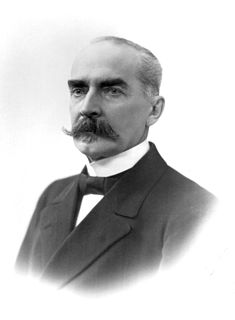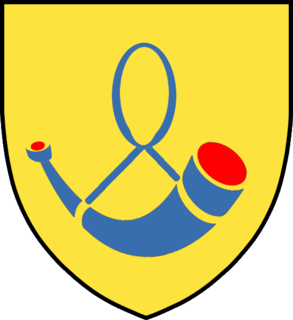Related Research Articles

Research is "creative and systematic work undertaken to increase the stock of knowledge". It involves the collection, organization and analysis of evidence to increase understanding of a topic, characterized by a particular attentiveness to controlling sources of bias and error. These activities are characterized by a to accounting and controlling for biases in t. A research project may be an expansion on past work in the field. To test the validity of instruments, procedures, or experiments, research may replicate elements of prior projects or the project as a whole.

Kaarlo Juho Ståhlberg was a Finnish jurist and academic, which was one of the most important pioneers of republicanism in the country. He was the first president of Finland (1919–1925) and a liberal nationalist.

Nils Adolf Erik Nordenskiöld was a Finland-Swedish aristocrat, geologist, mineralogist and Arctic explorer. He was a member of the Fenno-Swedish Nordenskiöld family of scientists and held the title of a friherre (baron).
Harald or Haraldr is the Old Norse form of the given name Harold. It may refer to:

Carl Joachim Hambro was a Norwegian journalist, author and leading politician representing the Conservative Party. A ten-term member of the Parliament of Norway, Hambro served as President of the Parliament for 20 of his 38 years in the legislature. He was actively engaged in international affairs, including work with the League of Nations (1939–1940), delegate to the UN General Assembly (1945–1956) and member of the Norwegian Nobel Committee (1940–1963).

The Conference on Security and Cooperation in Europe (CSCE) was a key element of the détente process during the Cold War. Although it did not have the force of a treaty, it recognized the boundaries of postwar Europe and established a mechanism for minimizing political and military tensions between East and West and improving human rights in the Communist Bloc. The first phase was the Meeting of Foreign Ministers in Helsinki in 1973, the second negotiations held in Geneva from 1973 to 1975, and the third the Helsinki summit in 1975. The final document was signed in Helsinki, Finland on August 1, 1975, by 33 European nations, the United States and Canada. It is often called the Helsinki Agreement. In 1994, the Organisation for Security and Cooperation in Europe (OSCE) was established as a successor to CSCE.
The origin of the name Kainuu has been disputed among Finnish historians and linguistics. Kainuu is a region of Finland. The reason for the controversy is the speculated connection between areas known as Kainuu and Kvenland, both historical lands in Fennoscandia.

Jägerhorn af Spurila is a noble family, registered with number 114 in the Swedish House of Nobility and number 5 in the Finnish House of Nobility. Members of this family live in Finland, Sweden, France and the United States.
Nordic Music Days is the oldest ongoing collaboration among the Nordic countries: a festival for new Nordic music that was founded in 1888 and had its origins in existing musical collaboration. It is one of the oldest and best respected festivals for contemporary classical music in the world. The festival is unique in the respect that it is arranged by the composers themselves. Each year one of members, the national societies of composers, arranges the festival on behalf of the Council of Nordic Composers.
Baktruppen was an artist collective (1986–2011), founded in Bergen, Norway. The group has had a substantial impact on European live art.

Socken is the name used for a part of a county in Sweden. In Denmark similar areas are known as sogn, in Norway sokn or sogn and in Finland pitäjä(socken). A socken is a country-side area that was formed around a church, typically in the Middle Ages. A socken originally served as a parish. Later it also served as a civil parish or an administrative parish, and became a predecessor to today's municipalities of Sweden, Finland, Norway and Denmark. Today it is a traditional area with frozen borders, in Sweden typically identical to those of the early 20th century country-side parishes. The socken also served as a registration unit for buildings, in Sweden recently replaced by identical districts as registration unit. A socken consists of several villages and industry localities, and is typically named after the main village and the original church.
Giaco Schiesser is a Zurich-based theorist of cultural and media studies. He is a professor emeritus for cultural theory and media theory and for artistic research of Zurich University of the Arts, ZHdK (Switzerland).

Zurich University of the Arts has approximately 2,500 students, which makes it the largest arts university in Switzerland. The university was established in 2007, following the merger between Zurich's School of Art and Design (HGKZ) and the School of Music, Drama, and Dance (HMT). ZHdK is one of four universities affiliated to Zürcher Fachhochschule.
Albert Joseph Maria Defant was an Italian-Austrian meteorologist, oceanographer and climatologist. He published fundamental works on the physics of the atmosphere and ocean and is regarded as one of the founders of physical oceanography.
Johan Roos is a Swedish organizational theorist known for his work on intellectual capital. He currently serves as Chief Strategy Officer at Hult International Business School, previously having served as President of Copenhagen Business School and Dean of the Stockholm School of Economics.
The Scandinavian Logic Society, abbreviated as SLS, is a not-for-profit organization with objective to organize, promote, and support logic-related events and other activities of relevance for the development of logic-related research and education in the Nordic Region of Europe.
Henk Borgdorff (1954) is an Amsterdam-based academic, specialised in music theory and artistic research. He is emeritus professor for research in the arts at Leiden University and at the Royal Conservatory of The Hague, University of the Arts The Hague (Netherlands).

Johan Petri is a Swedish theatre director, dramatist, and theatre scholar.
References
- ↑ Wilson, Nick and van Ruiten, Schelte / ELIA, eds. (2013), SHARE Handbook for Artistic Research Education (Chapter 8), Amsterdam: Valand Academy, pp. 248.
- ↑ ELIA-Share-Network bibliography (accessed Apr 19, 2013)
- ↑ Schiesser, Giaco (2015), What is at stake – Qu’est ce que l’enjeu? Paradoxes – Problematics – Perspectives in Artistic Research Today, in: Arts, Research, Innovation and Society. Eds. Gerald Bast, Elias G. Carayannis [= ARIS, Vol. 1]. Wien/New York: Springer 2015, p. 207.
- ↑ Swiss Science and Technology Research Council (2011), Research Funding in the Arts [accessed Feb 3, 2014]
- ↑ Borgdorff, Henk (2012), The Conflict of the Faculties. Perspectives on Artistic Research and Academia (Chapter 11: The Case of the Journal for Artistic Research), Leiden: Leiden University Press.
- ↑ Schwab, Michael, and Borgdorff, Henk, eds. (2014), The Exposition of Artistic Research: Publishing Art in Academia, Leiden: Leiden University Press.
- ↑ Wilson, Nick and van Ruiten, Schelte / ELIA, eds. (2013), SHARE Handbook for Artistic Research Education, Amsterdam: Valand Academy, p. 249.
- ↑ Hughes, Rolf: "Leap into Another Kind: International Developments in Artistic Research," in Swedish Research Council, ed. (2013), Artistic Research Then and Now: 2004–2013, Yearbook of AR&D 2013, Stockholm: Swedish Research Council.